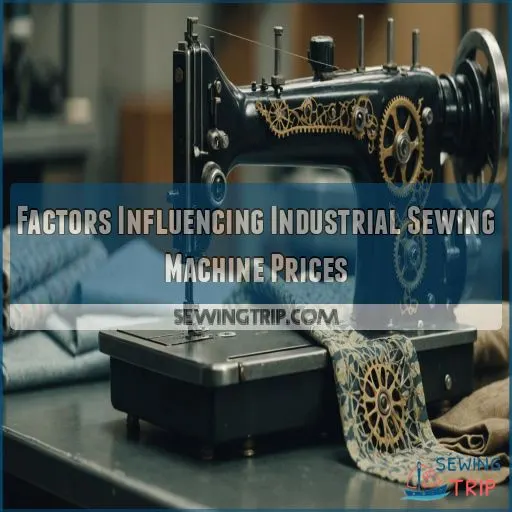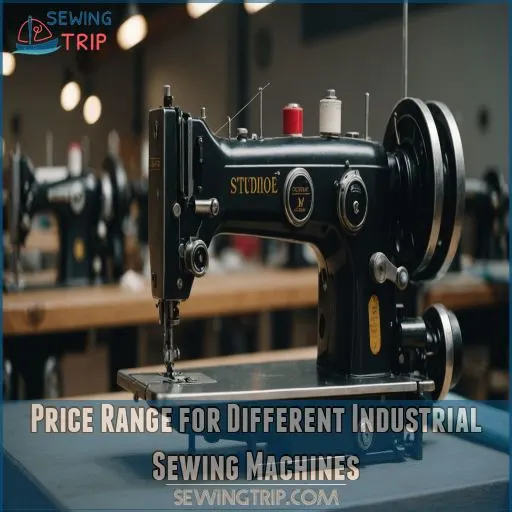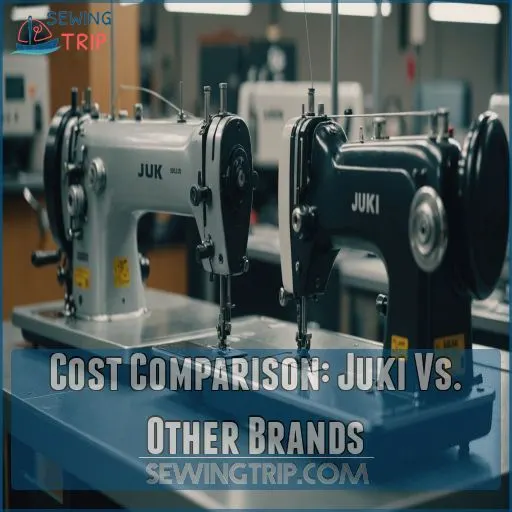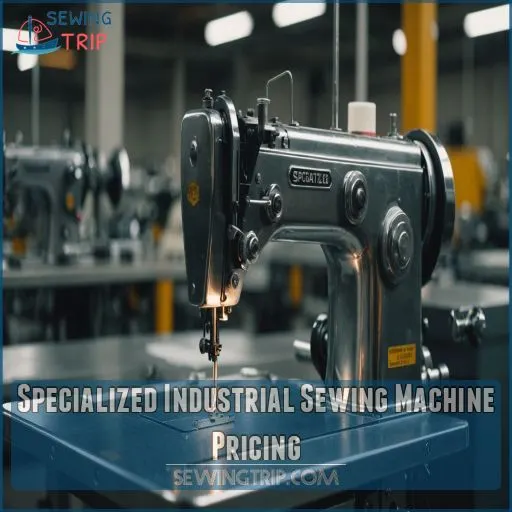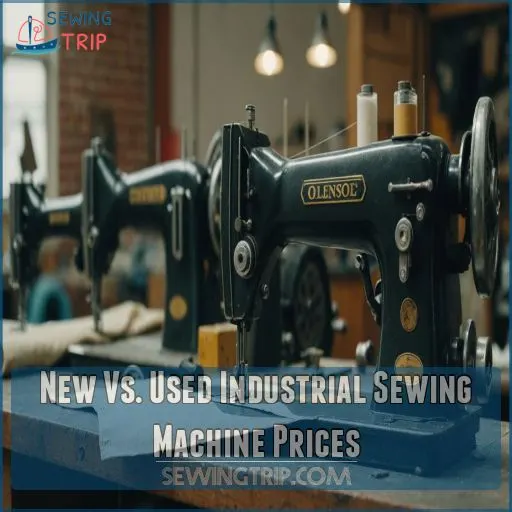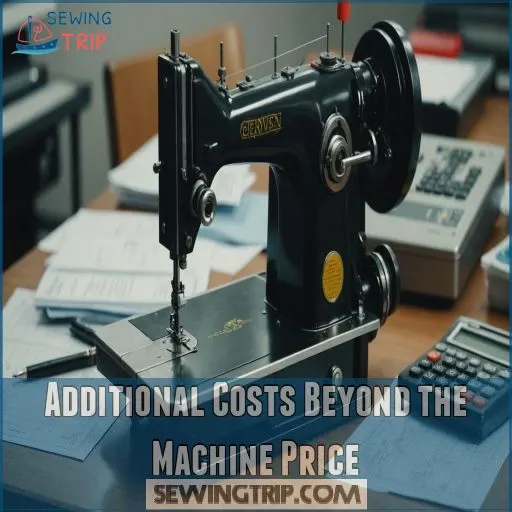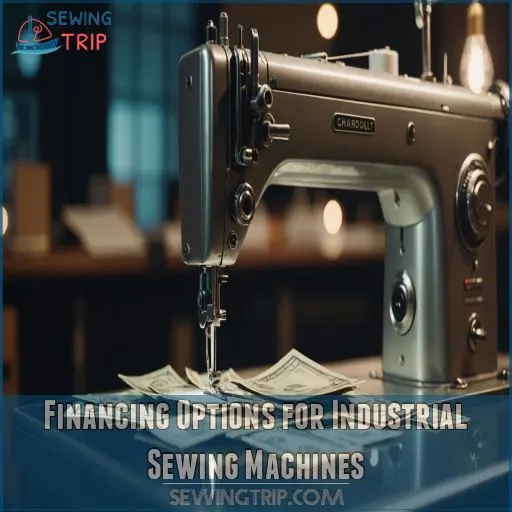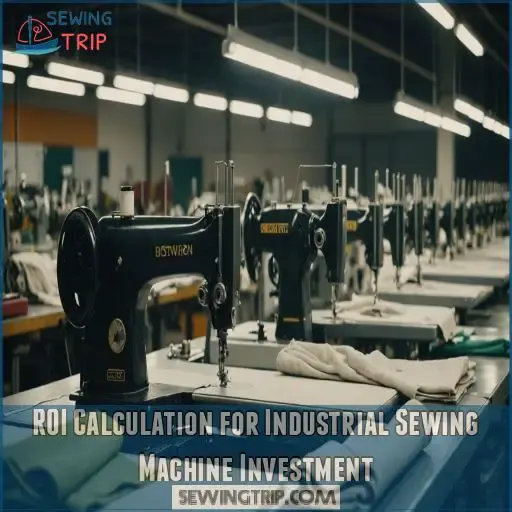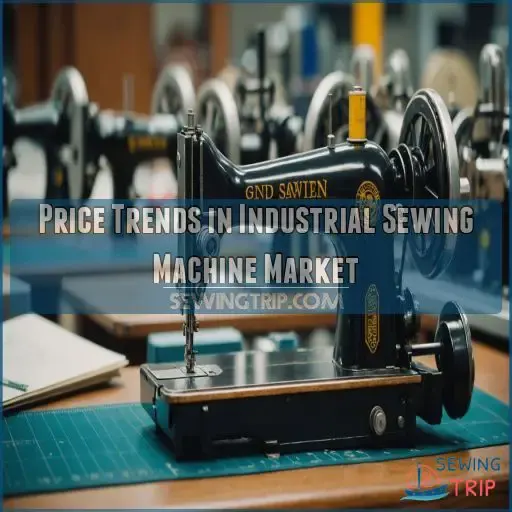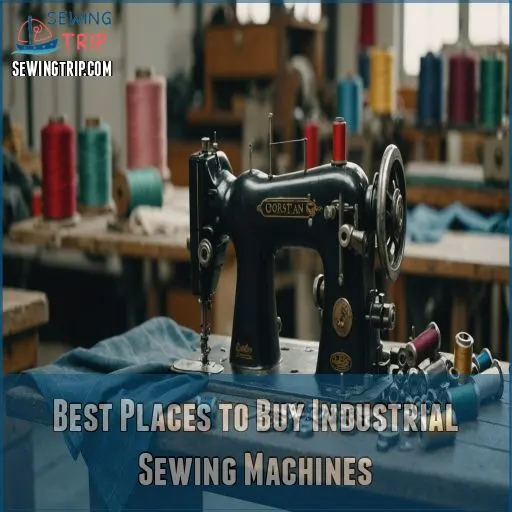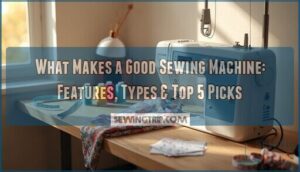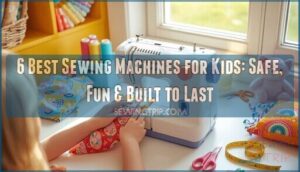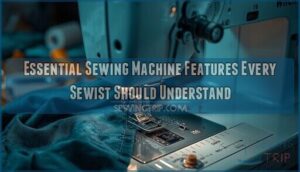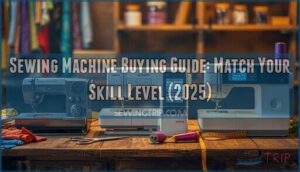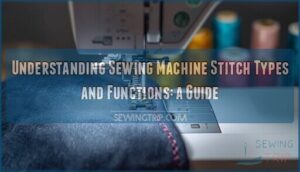This site is supported by our readers. We may earn a commission, at no cost to you, if you purchase through links.
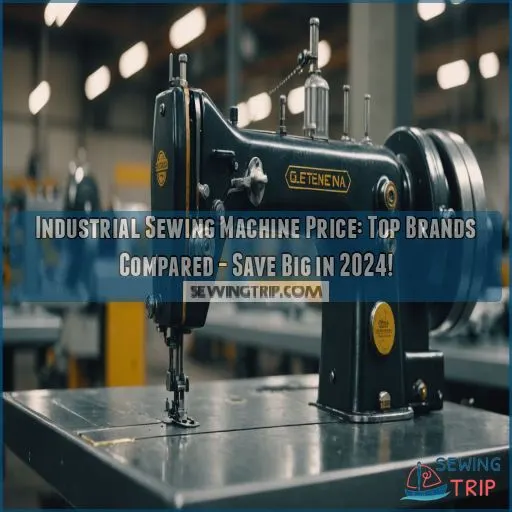
Most folks find their sweet spot in the $1,000 to $7,000 range. But don’t let sticker shock scare you off! Remember, you’re investing in a productivity powerhouse.
Factors like brand reputation, machine type, and fancy features all play a role in the final price tag. Think of it as choosing between a trusty sedan and a luxury sports car – both’ll get you there, but one might have heated seats and a smoother ride.
Curious about which brands offer the best bang for your buck?
Table Of Contents
- Key Takeaways
- Factors Influencing Industrial Sewing Machine Prices
- Price Range for Different Industrial Sewing Machines
- Cost Comparison: Juki Vs. Other Brands
- Specialized Industrial Sewing Machine Pricing
- New Vs. Used Industrial Sewing Machine Prices
- Additional Costs Beyond the Machine Price
- Financing Options for Industrial Sewing Machines
- ROI Calculation for Industrial Sewing Machine Investment
- Price Trends in Industrial Sewing Machine Market
- Best Places to Buy Industrial Sewing Machines
- Frequently Asked Questions (FAQs)
- Conclusion
Key Takeaways
- You’ll find a wide range of prices, from $500 budget-friendly options to $30,000+ specialized machines, with most folks landing in the sweet spot of $1,000 to $7,000. It’s like shopping for a car – you’ve got your trusty sedans and your luxury sports models!
- Don’t let sticker shock scare you off – factors like brand reputation, machine type, and fancy features all play a role in the final price tag. Think of it as investing in a productivity powerhouse that’ll have your business humming along smoothly.
- You’ve got options beyond buying new – consider refurbished machines for a sweet spot between cost and quality, or explore leasing if you’re not ready to commit. It’s like finding a certified pre-owned machine that won’t break the bank!
- Look beyond the price tag and factor in long-term savings. A quality machine can slash labor costs, boost efficiency, and improve product quality. It’s like planting a money tree that grows with every stitch!
Factors Influencing Industrial Sewing Machine Prices
When you’re in the market for an industrial sewing machine, you’ll quickly discover that prices can vary widely.
From brand reputation to technological features, several key factors influence the cost of these workhorse machines, and understanding them can help you make a savvy investment that’ll keep your business humming along smoothly.
Brand Reputation and Quality
When you’re looking for industrial sewing machines, brand reputation and quality are your golden tickets to reliability. You’ll find heavyweights like Juki and Singer standing tall, their names synonymous with durability.
But don’t overlook up-and-comers like Kingstar and Gemsy, who are stitching their way into the spotlight.
Remember, a trusted brand isn’t just a fancy logo – it’s your insurance against downtime and frustration. Choose wisely, and your machine might just outlast your great-grandkid’s first sewing project, especially if you pick a heavy-duty model!
Machine Type and Functionality
Your industrial sewing machine’s type and functionality play a huge role in its price tag, as you can see by reviewing the top industrial sewing machines listed in this article. Lockstitch machines, the workhorses of the industry, are often more affordable.
But if you’re eyeing specialized beasts like overlock or serger machines, be prepared to shell out more.
Walking foot and cylinder bed models? They’ll cost you a pretty penny too.
Remember, the more versatile and feature-packed your machine, the heftier the price.
Motor Power and Speed
Moving from machine types, let’s talk power and speed. You’ll find that motor power and RPM greatly impact your industrial sewing machine‘s performance.
A heavy-duty motor can handle thicker fabrics with ease, while higher speeds boost productivity.
But don’t forget – more power often means higher energy use. Choosing the right motor for your needs is like finding the perfect dance partner for your sewing projects.
Durability and Lifespan
While motor power revs up your productivity, durability and lifespan keep your investment humming for years.
Think of it as the marathon runner of the sewing world – built to go the distance.
Extra heavy-duty machines might cost more upfront, but they’ll save you a pretty penny on repairs and parts in the long run.
Don’t forget to factor in maintenance costs and warranty coverage when crunching the numbers.
Technological Features and Automation
Technological features and automation have revolutionized industrial sewing machines, driving prices up but offering incredible benefits.
You’ll find these cutting-edge machines packed with:
- Touchscreen interfaces for easy operation
- Automatic thread tension control
- Built-in pattern libraries
- IoT connectivity for remote monitoring
- AI-powered defect detection
These smart sewing marvels might cost a pretty penny, but they’re worth their weight in gold. Imagine never having to fiddle with tension settings again – it’s like having a digital tailor at your fingertips!
Production Capacity and Efficiency
Production capacity and efficiency often dictate the price tag of industrial sewing machines. You’ll find that machines with higher sewing speeds, like the DDL-9000C, command premium prices.
But don’t overlook operator training and line setup – they’re key to maximizing your investment.
Smart buyers consider batch size capabilities and waste reduction features. The LU-1560N and DNU-1541S, for instance, offer impressive throughput for their price points. Remember, a faster machine isn’t always the most cost-effective for your specific needs.
Price Range for Different Industrial Sewing Machines
Now that you understand the factors influencing industrial sewing machine prices, let’s take a closer look at the actual price ranges you’ll encounter. You’re in for a treat – there’s a machine for every budget and need!
Entry-level lockstitch machines start around $500, perfect for small businesses dipping their toes in the industrial pool. Mid-range models with added features like unison feed or walking foot capabilities can set you back $1,000 to $3,000. If you’re eyeing a high-end straight lockstitch or 3-needle coverstitch machine, be prepared to shell out $3,000 to $7,000.
Specialized machines come with heftier price tags. Embroidery machines can range from $5,000 to a whopping $30,000, while cylinder bed machines for intricate work might cost $8,000 to $15,000. Remember, these prices often don’t include the pedestal stand, so factor that in too!
Cost Comparison: Juki Vs. Other Brands
You’re in for a treat as we compare Juki’s pricing with other top industrial sewing machine brands.
Get ready to see how these giants stack up against each other, and maybe even find a bargain that’ll make your wallet do a happy dance.
Juki DDL-8700 Vs. Kingstar KS 8700
Let’s take a look at the battle of the budget-friendly workhorses: Juki DDL-8700 vs. Kingstar KS 8700. While both offer reliable performance, there are key differences to think about:
- Price: Kingstar KS 8700 is typically 30-40% cheaper
- Features: Juki offers more advanced tension control
- Reliability: Juki’s reputation for longevity is unmatched
- Warranty: Juki often provides longer coverage
Remember, sometimes you get what you pay for – but the Kingstar might just surprise you with its bang for your buck!
Juki LU-1508NH Vs. Gemsy 0303
For heavy-duty sewing, the Juki LU-1508NH and Gemsy 0303 are titans in their own right.
Let’s break down how these powerhouses stack up:
| Feature | Juki LU-1508NH | Gemsy 0303 |
|---|---|---|
| Performance | Powerhouse | Workhorse |
| Reliability | Rock-solid | Dependable |
| Price | Premium | Budget-friendly |
While the Juki’s reliability is legendary, the Gemsy offers impressive bang for your buck.
Your choice depends on whether you’re after top-tier performance or wallet-friendly efficiency.
Juki MO-6814S Vs. Typical GC6-7
Moving on from walking foot machines, let’s compare two popular overlock models. The Juki MO-6814S and Typical GC6-7 go head-to-head in the battle of stitches.
You’ll find the Juki packs a punch with its lightning-fast 7,000 stitches per minute, while the Typical GC6-7 holds its own at 5,500 SPM.
Both machines offer impressive stitch quality, but Juki’s reputation for reliability might just give it the edge.
Juki TL2010Q Vs. Brother PQ1500SL
Now, let’s pit two popular semi-industrial machines against each other: the Juki TL2010Q and Brother PQ1500SL.
You’ll find these workhorses in many home studios and small businesses.
The Juki’s known for its rock-solid stitch quality, while the Brother boasts impressive sewing speed.
User reviews often praise the Juki’s durability, but the Brother’s lower price point turns heads.
Warranty comparison? The Brother might surprise you with its coverage.
Let’s break down the nitty-gritty details.
Juki LK1900S Vs. Gemsy 1202c
You’ve seen how the TL2010Q and PQ1500SL stack up.
Let’s shift gears to embroidery powerhouses.
The Juki LK1900S and Gemsy 1202c are in a league of their own.
While Juki’s reputation for quality shines, Gemsy’s price tag might make you do a double-take.
The LK1900S boasts impressive speed and precision, but the 1202c’s features could give it a run for its money.
Ready to weigh the pros and cons?
Specialized Industrial Sewing Machine Pricing
You’re about to discover the pricing landscape for specialized industrial sewing machines.
From leather workhorses to embroidery wizards, we’ll break down the costs of these niche machines so you can make an informed investment for your business.
Leather Sewing Machine Prices
After comparing Juki to other brands, let’s stitch together some insights on leather sewing machine prices and explore the top leather sewing machine recommendations. These specialized workhorses can cost a pretty penny, but they’re worth their weight in gold for leather crafters.
When shopping, keep an eye out for:
- Heavy-duty walking foot models
- Adjustable presser foot pressure
- High-torque motors
Prices typically range from $1,000 to $5,000, depending on features and brand reputation. Remember, investing in quality now can save you a bundle in repairs down the road!
Embroidery Machine Costs
Embroidery machines can be a significant investment, but they’re worth their weight in gold for businesses looking to expand their offerings. Let’s break down the costs associated with these specialized machines:
| Machine Type | Price Range | Features |
|---|---|---|
| Entry-level | $5,000-$10,000 | Single-head, limited designs |
| Mid-range | $10,000-$25,000 | Multi-head, wider design options |
| Professional | $25,000-$100,000+ | Multi-head, industrial-grade, advanced software |
| Custom | $100,000+ | Fully automated, high-volume production |
Embroidery machines are a valuable investment for businesses looking to expand their offerings.
Software costs can range from $500 to $5,000 and are essential for design creation and management.
Remember, it’s not just about the machine – factor in software, thread, and maintenance costs too!
Overlock and Serger Machine Pricing
When it comes to industrial sewing, overlock and serger machines are the unsung heroes of finishing edges.
You’ll find these workhorses ranging from $800 to $5,000, depending on their features and brand.
Budget-friendly options like the Kingstar Industrial Overlock start at around $8,000, while high-end models from Juki or Brother can set you back $15,000 or more.
Remember, investing in quality pays off in the long run!
Walking Foot Machine Price Range
If you’re thinking about getting a walking foot machine, you’re looking at a price range that’ll make your wallet do a double-take.
These workhorses typically run from $2,000 to $5,000, depending on brand and features.
Juki and Consew offer solid options in the $3,000 range, while budget-friendly Kingstar models start around $2,000.
Remember, pricier machines often boast faster speeds and more advanced features, so choose wisely!
Cylinder Bed Machine Costs
You’ve seen walking foot machines, now let’s talk cylinder bed wonders! These specialized beauties come with a price tag, but they’re worth every penny. Here’s what you’re looking at:
- Entry-level models: $3,000 – $5,000
- Mid-range options: $5,000 – $8,000
- High-end machines: $8,000 – $15,000
- Custom or industrial-grade: $15,000+
Remember, investing in a cylinder bed machine is like buying a Swiss Army knife for your sewing arsenal – versatile and ready for any challenge!
New Vs. Used Industrial Sewing Machine Prices
You’re faced with a big decision when shopping for an industrial sewing machine: new or used?
We’ll break down the pros and cons of each option, helping you weigh factors like depreciation rates, refurbished pricing, warranty coverage, and long-term value to find the best deal for your budget and needs.
Depreciation Rates for Industrial Machines
Ready to tackle depreciation rates for industrial sewing machines? Let’s break it down. These workhorses lose value over time, but how much? Here’s a quick look at typical depreciation rates:
| Year | Light Use | Moderate Use | Heavy Use |
|---|---|---|---|
| 1-3 | 10-15% | 15-20% | 20-25% |
| 4-6 | 5-10% | 10-15% | 15-20% |
| 7+ | 3-5% | 5-10% | 10-15% |
Remember, proper maintenance can slow depreciation, keeping your investment stitching strong for years to come!
Refurbished Machine Pricing
Refurbished machines offer a sweet spot between new and used. They’re like the "certified pre-owned" of the sewing world. Here’s what you need to know:
- Quality control: Professionally refurbished machines undergo rigorous testing
- Cost savings: Expect to pay 30-50% less than new
- Updated features: Many refurbs receive modern upgrades
- Seller reputation: Choose trusted dealers for the best experience
Don’t let a tight budget hold you back. Refurbished machines can be your ticket to industrial-grade sewing without breaking the bank.
Warranty Considerations for Used Machines
When considering used industrial sewing machines, warranties become a hot topic. Let’s stitch together some key points:
| Warranty Type | Coverage | Pros | Cons | Best For |
|---|---|---|---|---|
| Standard | 30-90 days | Basic protection | Limited duration | Budget buyers |
| Extended | 1-3 years | Longer coverage | Extra cost | Peace of mind |
| Seller Guarantee | Varies | Often free | Depends on seller | Cautious shoppers |
A solid warranty can be your safety net, preventing your budget from unraveling if issues arise.
Cost-Benefit Analysis of New Vs. Used
You’ll often find yourself weighing the pros and cons of new versus used industrial sewing machines. Let’s break down the cost-benefit analysis:
- Depreciation: New machines lose value faster, while used ones have already taken the hit.
- Warranty: Fresh-from-the-factory comes with peace of mind, but used can be a gamble.
- Resale value: Newer models hold their worth better for future upgrades.
- Maintenance: Older machines might need more TLC, eating into your bottom line.
Consider your budget and long-term goals when making this investment decision.
Additional Costs Beyond the Machine Price
When you’re budgeting for an industrial sewing machine, don’t forget to factor in the hidden costs that can sneak up on you.
From must-have accessories to ongoing maintenance, these extras can add up faster than a serger on turbo mode – so let’s unpack what you’ll really be spending beyond that sticker price.
Accessories and Attachments Pricing
Accessorizing your industrial sewing machine can be a rabbit hole of expenses. Don’t get caught off guard! Here’s a quick rundown of common attachment costs:
| Accessory | Price Range ($) |
|---|---|
| Foot pedal | 30 – 100 |
| Needles (pack) | 5 – 20 |
| Bobbins (pack) | 10 – 30 |
| Presser feet | 15 – 50 each |
| Attachment sets | 100 – 500 |
Remember, these extras can add up fast. But hey, they’re the secret sauce that’ll take your sewing game to the next level!
Maintenance and Repair Expenses
Maintaining your industrial sewing machine isn’t just a stitch in time – it’s a vital investment.
Regular upkeep can save you from costly breakdowns and extend your machine’s lifespan.
Compare preventive maintenance costs across brands to find the best long-term value.
Don’t forget to factor in repair frequency, warranty coverage, and parts availability.
A well-maintained machine will keep your business humming along smoothly, just like a perfectly oiled bobbin.
Installation and Training Costs
The sticker shock doesn’t end with the machine’s price tag. When budgeting for your new industrial workhorse, don’t forget to factor in these hidden costs:
- Professional installation fees
- Operator training sessions
- Extended warranty packages
These extras can add a pretty penny to your investment, but they’re worth their weight in gold. Proper setup and know-how will keep your machine humming along smoothly, saving you headaches down the road. Remember, a little upfront investment can pay off big time in the long run.
Energy Consumption and Operating Costs
You’ve got your machine set up, but don’t forget about the ongoing costs! Energy consumption can sneak up on you, adding to your monthly bills.
Modern industrial sewing machines are often more energy-efficient, potentially saving you money in the long run. Keep an eye on power ratings and opt for models with energy-saving features. It’s like choosing a fuel-efficient car – your wallet will thank you!
Financing Options for Industrial Sewing Machines
You don’t have to break the bank to get your dream industrial sewing machine.
From leasing options to manufacturer financing programs, there are plenty of ways to make that high-end Juki or Brother more affordable.
We’ll show you how to stitch together a deal that won’t leave your wallet in tatters.
Leasing Vs. Purchasing Outright
If you’re thinking about financing your industrial sewing machine, you’re faced with a choice: lease or buy?
Leasing offers flexibility and lower upfront costs, but you won’t own the machine.
Purchasing outright gives you full ownership and potential tax benefits, but requires a bigger initial investment.
Consider your cash flow, long-term plans, and how quickly the technology might become outdated.
It’s like deciding between renting or buying a home for your business!
Manufacturer Financing Programs
Worried about forking over a lump sum for your dream machine?
Many manufacturers have your back with financing programs.
These tailor-made options can help you snag that industrial powerhouse without breaking the bank.
From flexible payment schedules to competitive interest rates, you’ll find a plan that fits like a glove.
Just remember to read the fine print and compare credit requirements before signing on the dotted line.
Small Business Loans for Equipment
The financial landscape for small businesses can be tricky to navigate.
But don’t fret! Small business loans offer a lifeline when you’re eyeing that shiny new industrial sewing machine.
- Check your loan eligibility with multiple providers
- Compare interest rates to find the best deal
- Scrutinize loan terms for hidden fees
- Explore flexible repayment options that fit your cash flow
Remember, the right loan can stitch together your business dreams!
Tax Implications and Depreciation Benefits
Investing in an industrial sewing machine? You’re in for some sweet tax perks! Think of it as Uncle Sam giving you a high-five for boosting your business. You can deduct the purchase as a business expense, potentially lowering your tax bill.
Plus, asset write-offs and depreciation schedules can spread the benefits over time.
It’s like turning your stitching powerhouse into a money-saving machine!
ROI Calculation for Industrial Sewing Machine Investment
You’ve got your eye on an industrial sewing machine, but is it worth the investment?
Let’s crunch the numbers and see how these powerhouse machines can boost your bottom line, from slashing labor costs to stitching up some serious long-term savings.
Labor Cost Reduction Potential
You’ve crunched the numbers on financing—now let’s talk about boosting your bottom line. Industrial sewing machines can be game-changers for labor costs.
By ramping up automation and efficiency, you’ll see a dramatic uptick in output.
Sure, there’s an initial investment in training, but it beats outsourcing any day.
Imagine this: your production line humming along, churning out products faster than ever. That’s the kind of ROI that’ll have you smiling all the way to the bank.
Quality Improvement Financial Impact
While reducing labor costs is great, don’t overlook the financial windfall of quality improvements.
Investing in a high-quality industrial sewing machine can be a game-changer for your bottom line.
Imagine slashing defects, ramping up output, and turbocharging your turnaround times.
Your brand’s value skyrockets, and clients can’t stop singing your praises.
It’s like giving your business a superpower – the ability to deliver perfection at lightning speed!
Long-Term Cost Savings Analysis
When crunching the numbers for your industrial sewing machine investment, don’t just look at the sticker price. Factor in how it’ll boost your efficiency and slash labor costs over time.
Consider the machine’s lifespan, potential for reduced maintenance, and tax benefits from depreciation.
By weighing these long-term savings against upfront costs, you’ll get a clearer picture of your true ROI. It’s like planting a money tree that grows with every stitch!
Price Trends in Industrial Sewing Machine Market
You’ll want to keep a close eye on industrial sewing machine prices in 2024, as the market’s constantly evolving.
From tech upgrades to supply chain hiccups, we’ll break down the factors that’ll shape your wallet when you’re shopping for that perfect stitching powerhouse.
Technological Advancements Impact on Pricing
After crunching the numbers, let’s look at how tech advances are shaking up sewing machine prices. Innovation’s a double-edged needle in this industry.
On one hand, cutting-edge features like touchscreens and AI-driven stitching boost efficiency but can inflate costs.
On the flip side, automation often leads to streamlined production, potentially lowering prices. It’s a balancing act between high-tech perks and your wallet’s comfort zone.
Supply Chain Disruptions and Price Fluctuations
Ever wondered how global events ripple through the sewing industry?
Supply chain hiccups can send industrial sewing machine prices on a rollercoaster ride.
Raw material costs, shipping snags, and manufacturing delays all play their part in this pricing puzzle.
Labor shortages add another thread to the tangle, while market volatility keeps everyone on their toes.
It’s like a game of economic Jenga – one wrong move, and prices could topple!
Currency Exchange Rate Effects
You’ve seen how supply chain issues can shake up prices, but let’s talk money – the global kind. Currency exchange rates play a big role in industrial sewing machine costs. Here’s how they affect your wallet:
- Import costs fluctuate with exchange rates
- Local pricing may adjust to compensate
- International sales become more or less attractive
- Market volatility can lead to sudden price shifts
It’s like a financial tango – sometimes you lead, sometimes you follow. Keep an eye on those rates!
Industry Demand and Pricing Correlations
While currency fluctuations can shake up pricing, let’s talk shop about how industry demand impacts your wallet.
The sewing machine market‘s a bit like a seesaw – when demand goes up, so do prices.
But it’s not all doom and gloom! Market competition keeps things interesting, often leading to better deals for savvy buyers.
Keep an eye on production costs and raw material prices too – they’re the puppet masters behind the scenes.
Best Places to Buy Industrial Sewing Machines
Finding the best deal on an industrial sewing machine can be a bit like hunting for treasure, but we’ve got your map right here.
Whether you’re eyeing a shiny new Juki or a budget-friendly Kingstar, we’ll show you where to snag the best prices without sacrificing quality.
Authorized Dealers Vs. Online Marketplaces
If you’re looking to buy industrial sewing machines, you’ve got two main options: authorized dealers and online marketplaces.
Authorized dealers offer expert advice, hands-on demos, and solid warranties.
They’re your go-to for excellent customer service and peace of mind.
Online marketplaces, on the other hand, can be a treasure trove of deals.
You’ll find a wider selection and often lower prices, but be sure to compare shipping costs and seller reputation.
Trade Show and Exhibition Pricing
After exploring authorized dealers and online marketplaces, let’s check out trade shows and exhibitions. These events offer unique opportunities to snag great deals on industrial sewing machines. Vendors often showcase their latest models with special "show prices" that can save you a pretty penny.
Don’t be shy about haggling – many exhibitors are willing to negotiate rates right on the spot. It’s like a treasure hunt for savvy buyers!
Bulk Purchase Discounts
Your wallet’s best friend? Bulk purchase discounts! When you’re in the market for multiple industrial sewing machines, you’ve got serious bargaining power. Here’s how to make the most of it:
- Master the art of negotiation to secure jaw-dropping deals
- Build rock-solid vendor relationships for long-term savings
- Determine your minimum order sweet spot for maximum discounts
Remember, when it comes to bulk buying, your negotiation skills are your secret weapon. Flex those bargaining muscles and watch the savings roll in!
Seasonal Sales and Promotions
Moving on from bulk discounts, let’s explore seasonal sales and promotions. You’ll find incredible deals on industrial sewing machines if you know when to look. Here’s a handy guide to help you snag those bargains:
| Season | Event | Typical Discounts |
|---|---|---|
| Winter | Black Friday | 20-40% off |
| Spring | Easter Sales | 15-25% off |
| Summer | End-of-Season | 30-50% off |
| Fall | Back-to-School | 10-20% off |
Keep your eyes peeled for these golden opportunities to upgrade your sewing arsenal without breaking the bank!
Frequently Asked Questions (FAQs)
How often should industrial sewing machines be serviced?
Service your industrial sewing machine every 6-12 months for best performance.
Regular maintenance keeps it purring like a well-oiled kitten.
Don’t wait for issues to crop up; prevention is key to avoiding costly downtime.
What warranty options are available for industrial machines?
Like a safety net for your trusty workhorse, warranty options for industrial machines often include 1-5 year coverage.
You’ll find protection against defects, parts replacement, and labor costs.
Don’t forget to ask about extended warranties too!
Can industrial sewing machines handle heavy-duty materials?
Industrial sewing machines are built tough.
They’ll power through leather, canvas, and denim like a hot knife through butter.
Just remember, you’ll need the right needle and thread for those hefty materials.
Happy stitching!
Are there eco-friendly options in industrial sewing machines?
Intrigued by eco-friendly options? You’re in luck! Many manufacturers are embracing sustainability, offering energy-efficient motors, recycled materials, and waste-reducing features.
They’re not just good for the planet; they’ll also slash your energy bills.
It’s a win-win situation!
How do industrial sewing machine speeds compare?
Industrial sewing machines zip along at lightning speeds, typically ranging from 1,000 to 5,500 stitches per minute.
Higher-end models can reach a blazing 9,000 SPM, leaving your home machine in the dust.
Speed demons, rejoice!
Conclusion
Imagine this: you’re threading the needle of success with your new industrial sewing machine. The price tag might’ve made you sweat, but you’ve invested in a powerhouse that’ll turbocharge your productivity. Remember, industrial sewing machine prices vary widely, but you’ve got options to fit your budget and needs. Whether you’ve snagged a deal on a used workhorse or splurged on a cutting-edge model, you’re now equipped to tackle any project. So fire up that machine and watch your business soar – stitch by stitch!

